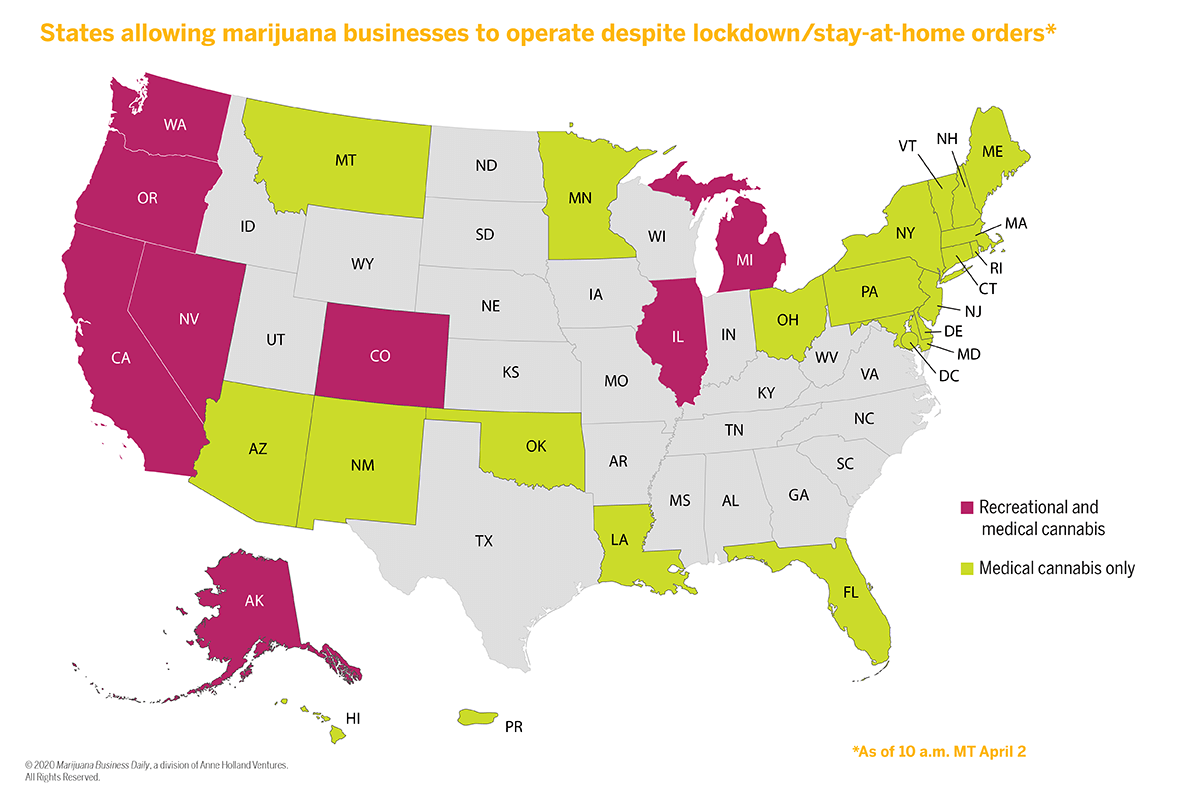Marijuana businesses navigating staffing issues during the COVID-19 outbreak are taking different tacks as they strive to keep employees and customers healthy and safe – while keeping close tabs on their companies’ bottom lines.
Some businesses are seeing a spike in sales, but others are concerned about the economic and financial fallout from the coronavirus pandemic.
Strategies different cannabis companies are using or considering include:
- Ramping up hiring to ensure existing employees aren’t overloaded or forced to come to work when they’re sick.
- Furloughs, layoffs, terminations or a combination to conserve cash.
- Adjusting store hours and shifts.
An example of one company adding staff is Los Angeles marijuana retailer Sweet Flower, which hired a district manager for retail operations, as well as marketing employees, store managers and temporary workers, CEO Timothy Dodd said.
“We are hiring to give some of our staff a break, and so if people don’t feel well, they don’t have to come in,” Dodd said. “We’re trying to be a responsible employer at this time.”
Santa Rosa, California-based manufacturer NewTropic has added additional shifts and hired five people in recent weeks, CEO Alex Rowland said. Rowland anticipates hiring up to 20 more over the next 45 days.
“People are consuming a lot of cannabis right now,” Rowland said. “People still need to eat and they still need access to cannabis, so we’re rising to the occasion.”
Some cannabis companies are laying off workers, but there has been an uptick in businesses hiring temporary workers over the past few weeks, even as the coronavirus pandemic has spread, said Liesl Bernard, CEO of the San Diego-based staffing firm CannabizTeam.
The top temp positions are warehouse technicians, budtenders, dispatch managers and extraction technicians, she noted.
Oakland, California-based Harborside hired two more employees and plans to add two temporary workers to handle the volume at its drive-thru marijuana store in Desert Hot Springs, California, said Pedro Fonseca, general manager of the company’s stores. Harborside also is hiring more delivery drivers.
CannabizTeam also has continued to recruit executives for some companies, including multistate operators.
“MSOs are hiring executives,” Bernard said. “I have two companies that have made offers to executives. They’re still moving forward with interviews.”
Chalice Farms in Portland, Oregon, has multiple job listings for its six retail stores as well as its packaging and production facilities.
Chalice Farms is encouraging those laid off from jobs in the hospitality industry to apply for the positions.
“There’s a secondary disease to this pandemic, and it’s in the millions of people who are now out of work,” Chalice Farms CEO Jeff Yapp said. “We want to give hardworking employees a safe and stable workplace to fulfill this need in our community.”
Workforce reduction
But with the rapid spread of COVID-19, hiring could slow and a scenario in which more cannabis businesses slash their workforces could play out.
If that’s the case, employers should consult with their attorneys to ensure they’re following labor laws, said Martine Wells, an attorney with Denver-based Brownstein Hyatt Farber Schreck who focuses on employment law.
Wells said she’s received calls from many clients asking whether they should lay off employees and seeking the best method to do so.
“They want to know what all the attendant administrative and operational considerations are and what are the final paycheck requirements,” Wells said.
“The path of least resistance is to terminate now and revisit as soon as operations return to normal.”
Since cannabis still remains illegal at the federal level, marijuana companies cannot use the banking system or take tax write-offs that other businesses can.
But when it comes to employment law, Wells said, marijuana businesses should comply with the federal Worker Adjustment and Retraining Notification (WARN) Act, which was implemented to protect most employees and requires companies with 100 or more staffers to provide 60-day advance notification of plant closings and mass layoffs.
A clause in the law that exempts employers from the 60-day notice for unforeseen business circumstances could apply because of the coronavirus crisis but has not been tested since the statute went into effect in 1988, Wells said.
Companies can reduce their workforces through furloughs, terminations, layoffs or a combination of the three, Wells said. Employees are eligible for unemployment in all scenarios.
A furlough is when a worker remains an employee but does not work unless requested. Such employees are paid only if they are asked to work.
A layoff is an indication from the employer that if normal operations resume, the employee will be considered for future employment.
“If doing a hybrid approach, it’s important to ensure the decisions are made based on uniform and objective factors as opposed to impermissible factors to protect employers against a future claim of ‘You used coronavirus to lay off disabled, older or women workers,’” Wells said.
Keeping employees working
Cannabis businesses that want to keep their doors open and employees on the job should consider reducing store hours to save costs on hourly workers, said Keegan Peterson, founder and CEO of Wurk, a Denver tech company offering a platform that helps cannabis companies manage human resource activities.
“A lot of people are deploying different strategies,” Peterson said. “It depends on how much cash they have.”
Other measures Peterson suggests that will help cannabis businesses stay open and keep people on the job include:
- Job sharing where two employees split a position so both can continue to work part time.
- Participating in the conversation as states make decisions about designating marijuana providers as “essential services.”
- Considering designated hours that are only for people older than 50 to help with health concerns this group of consumers might have.
- Advocating for accelerated badge approval to increase staff resources in case an employee is not comfortable coming to work or a family member becomes ill.
“Right now, it’s more important than ever to communicate,” Peterson said. “Your people need to know what’s going on.
“Cannabis companies need to talk to their people as frequently as possible.”
Margaret Jackson can be reached at margaretj@mjbizdaily.com
For more of Marijuana Business Daily’s ongoing coverage of the coronavirus pandemic and its effects on the cannabis industry, click here.






